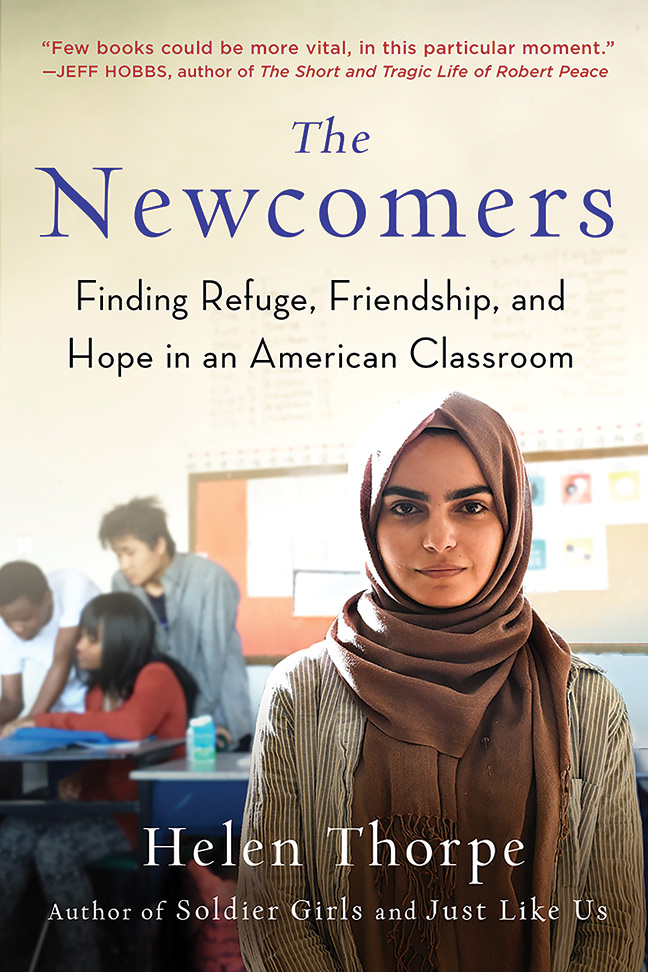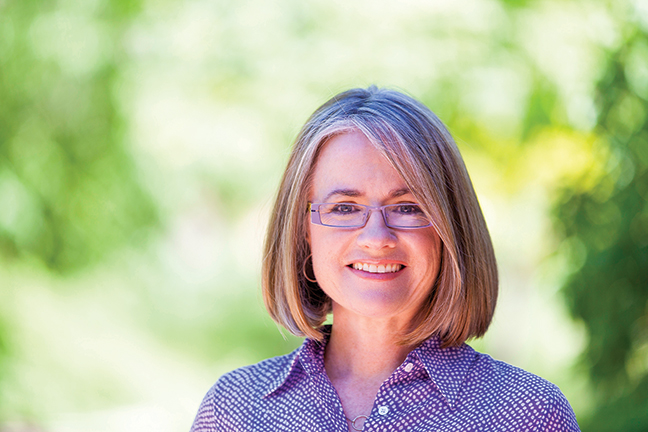Helen Thorpe is a Denver author of three books: Just Like Us, Soldier Girls and The Newcomers. She met me at the Tattered Cover on Colfax to chat about The Newcomers, which is set in South High School, and about her life as an author.
Favorite places: The Tattered Cover, the Bookies, libraries, the Museum of Contemporary Art Denver, and home (she’s a bit of a homebody)
Inspiration: being around like-minded people, visual arts, skiing, hiking or snowshoeing in the mountains
Favorite cookbook: Jerusalem by Yotam Ottolenghi
New Year’s resolution: start another book
Helen Thorpe likes book stores, cooking and gray areas. In large part, her motivation to write is about exposing the gray areas where the complexities of real life happen. Polarizing topics where our communal understanding seems superficial draw Thorpe in and fuel her desire to “do what she can from Denver to be helpful and beneficial to people.” The national tumult of 2015, during the run up to the 2016 presidential election, inspired her to reach out and connect with a myriad of individuals – such as Dr. Kristin Waters, former principal of South High School – and with the fascinating people featured in her work, who are linked to the immigrant experience. Those connections led to The Newcomers, Thorpe’s third and most recent book. She spent a year and a half in a newcomers’ classroom at our own South High School.
I was struck when I read the paragraph that begins, “Will we be worthy?” What did you mean by that?
There was a moment when I wondered if I would be worthy to tell the stories of the kids in the room and if I could do justice to what some of these families had lived through. I realized that I was in a classroom with Eddie Williams, who also wondered if he would be worthy of these kids as a teacher. We were inspired, basically, by the kids and we were asking ourselves the deep questions that caring people ask themselves. There were big stories in that room. Some of the most interesting and compelling stories that I have ever heard.
Ultimately, what was amazing to me about being in this one room at South was the way that the kids showed up over the course of the year and how their arrivals mapped everything of significance that was happening around the world. If there was a war in the Middle East, a kid would show up from that country. If there was a situation of chronic violence in a country in Africa, a kid would show up from there. If there was gang violence in Central America such that families couldn’t stay there safely anymore, kids would show up from THAT country. As a result, at the end of the school year, you had a perfect map of disturbances around the world, and of who was coming to the United States seeking safety.
The room had refugees, immigrants and asylum seekers. I showed up planning to write about refugees. They made up the majority of the kids in the room, but there were also kids from the other two groups.
 Did sitting in the classroom for so long change your view on how the high school experience has changed? Did it feel different from when you were in high school?
Did sitting in the classroom for so long change your view on how the high school experience has changed? Did it feel different from when you were in high school?
I was struck more by the similarities. There are pep rallies, Homecoming, spirit days, and posters about all of that. There are sports teams and student senate, regular classes and Advanced Placement classes – actually the structure of high school is very familiar. What is fascinating is to observe seventy-five plus countries mapped onto that and then to watch some kids – who have ambition, drive and capacity show up – and with minimal or no English, two years later attend AP classes and be in student senate. Methusella – a student from the Congo – is an example of that transformation. He ends up playing varsity soccer, a member of student senate, and reading To Kill a Mockingbird. Methusella just wrote me a note on Facebook Messenger asking me for a letter of reference because he is applying for college – it was a really exciting message to receive.
I love the chapter “Our Souls at Night,” when you describe the mother of two students and her anxiety.
Whitney Haruf was the social worker who worked with that family – she really helped me understand that what I was seeing was actually a result of PTSD and that it is very normal for a segment of the refugee population to experience similar symptoms after having lived in war zones. Ebtisam (the mother) would go from being distraught to being very grounded. I think that she suffered from a kind of chronic anxiety that is hallmark for many refugees. There is a study about Iraqi refugees that shows how they have emerged from their experiences with similar challenges.
At a recent book talk – my first after the paperback came out – Whitney’s mom, Ginger Haruf, and her sister showed up. It was amazing. She said that when she read that chapter, it was the most beautiful thing written down about her daughter that she had ever seen. It felt incredible to hear her say that.
How about your writing process – do you have any rituals?
I probably do have rituals, but I don’t think of them that way – more as habits. I like to write in the morning. My favorite writing time is between 8:00 a.m. and 11:00 a.m. Sometimes I write until noon or 1:00 p.m. That amount of writing is good for me. If I write 500 words, that’s a great day. 1000 words is an extraordinary day. I stop and try to do something else in the afternoon, whether it’s getting outside or seeing people, because I think that writing is isolating. I try to have phone conversations with other writers, family or friends. I might exercise or read or even do filing – something like that. Then, the next morning, I’m ready to go again.
 So, you’re not toiling away by the midnight oil.
So, you’re not toiling away by the midnight oil.
No, never. Sometimes if I wake up in the middle of the night with an idea I will write it down, but then I’ll make myself go back to sleep.
I’m in touch with two of the writers of my original writing group – Peter Heller (The Dog Stars, The River) and Lisa Jones (Broken: A Love Story). Lisa is also an amazing writing teacher, sometimes I take her classes. I had coffee with both of them this morning.
I have read for both of them to help with if a manuscript is ready to go out the door – Lisa for her newest manuscript and Peter for The River – before they’ve been sent in to the publisher. It is a total honor to be able to read something at that stage.
I’m sure that they feel the same about reading your work.
They’ve been there for me. Peter was my main reader on Soldier Girls and Lisa was my main reader on Newcomers. Lisa picked me up, dusted me off, and persuaded me to keep on going when I thought I needed to give up and not write Newcomers. I had spent a couple of months in the classroom and the kids were still very quiet. I called my editor – Colin Harrison from Scribner, who has been my amazing editor for all three books – and said, “I don’t think I can write this book because the kids aren’t saying anything and nothing’s happening in their room that I can see.” It was actually the silent phase of learning, before they spring into English, but I didn’t know that. I wrote the first chapter of the book with the kids not speaking, about the food bank and about them being hungry, and Lisa was like, “You HAVE to write this book. I really want to know what happens to these kids.”
Are you writing for newspapers and magazines anymore?
Every once in a while. I had been in journalism my whole adult life. As a kid I took unpaid internships at The Boston Phoenix and Atlantic Monthly. I moved to NYC and worked at The New York Times Magazine and The New Yorker. Then I got a job as a staff writer at Texas Monthly, so I moved to Austin and bought a pickup truck and cowboy boots and ate a lot of barbecue and made a lot of friends. That’s where I learned to write longer stories – some of the great editors at Texas Monthly helped me: Paul Burka, Greg Curtis, and Evan Smith. Then I took a break. I got married and had my son, and stayed home with him for a couple of years. I was at the point of getting back into writing and I thought that being an author would work better as a mom than being a journalist with short deadlines.
I would say that my journalism career taught me to make sure that my work is truthful, accurate, well-reported, and reliable.
Your parents are immigrants.
Yes, they were born in Ireland – my father in Dublin and my mother on a dairy farm. They met in London, married, had me and moved to New York soon after. I had a green card until I was 21 and decided that I wanted to be able to vote.
I hate that we’re in a time when people think that’s bad. I think it’s great that I got to grow up with two heritages. I had a huge family in Ireland – with a different accent, culture and allegiances – that I got to visit every other summer. I feel totally loyal to the US, but also completely appreciative of my Irish relatives and heritage. I think it enriches me to know two cultures. It’s not a bad thing. But we seem to live in an era when that is frowned on or something. I think it is to be celebrated.
Thank you, Helen, for sharing your thoughts with us and opening a window into the lives of our immigrant population. Here’s to a more welcoming 2019.


